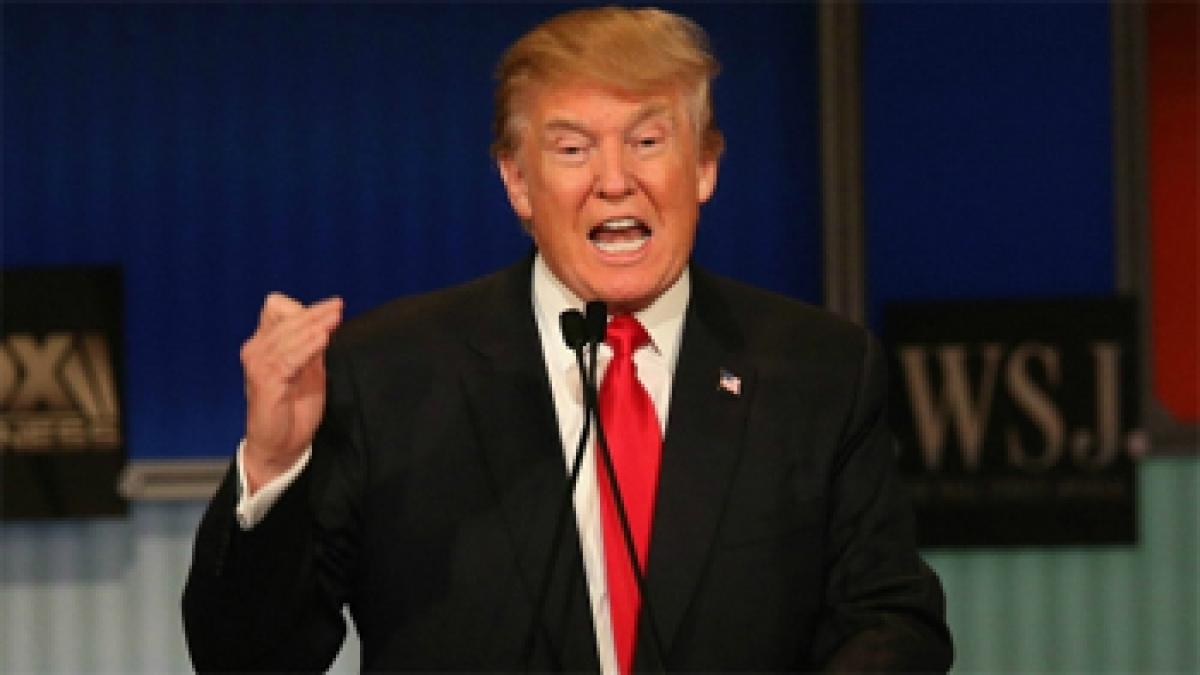Live
- ‘He is writing history’: Locals elated as PM Modi visits Prayagraj ahead of Mahakumbh
- TGRSA Formed to Revitalize Telangana's Revenue System and Safeguard Employees' Rights
- Days after ED raid, businessman and wife found dead in MP's Sehore
- Central Zone DCP Statement on Allu Arjun's Arrest
- Kinetic Green paves the way for Women’s Empowerment through innovative program and initiatives
- Russia hopes to keep military bases in Syria, Guterres urges deescalation
- ‘Pranayagodari’ review–Riveting village drama
- 6.7 kg Ganja Seized in Mangaluru Anti-Drug Crackdown
- Not only one Atul Subhash, there have been lakhs: PIL in SC on 'false' dowry cases
- Telangana CM A. Revanth Reddy Clarifies Comments on Allu Arjun Arrest, Stresses No Personal Grudge
Just In

Republican presidential front-runner Donald Trump said on Tuesday the United States should use waterboarding and other harsh interrogation techniques when questioning terror suspects, and renewed his call for tougher US border security after the attacks in Brussels.
Republican presidential front-runner Donald Trump said on Tuesday the United States should use waterboarding and other harsh interrogation techniques when questioning terror suspects, and renewed his call for tougher US border security after the attacks in Brussels.
The billionaire businessman said authorities "should be able to do whatever they have to do" to gain information in an effort to thwart future attacks.
"Waterboarding would be fine. If they can expand the laws, I would do a lot more than waterboarding," Trump said on NBC's "Today" programme, adding he believed torture could produce useful leads.
"You have to get the information from these people."
Waterboarding, the practice of pouring water over someone's face to simulate drowning as an interrogation tactic, was banned by President Barack Obama days after he took office in 2009. Critics call it torture.
Trump's main Republican rival, US Senator Ted Cruz of Texas, suggested heightened police scrutiny of neighbourhoods with large Muslim populations.
"We need to empower law enforcement to patrol and secure Muslim neighbourhoods before they become radicalized," he said in a statement.
Trump also called for increased law enforcement surveillance of mosques in the United States.
"You need surveillance. You have to deal with the mosques, whether we like it or not," Trump told Fox Business Network. "These attacks ... they're not done by Swedish people, that I can tell you."
ISIS claimed responsibility for Tuesday's suicide bomb attacks on Brussels airport and a rush-hour metro train in the Belgian capital which killed at least 30 people.
Trump, who has called for a temporary ban on Muslims entering the country, urged tougher measures to stop the flow of illegal immigrants, particularly Syrian refugees, into America.
"As president ... I would be very, very tough on the borders, and I would be not allowing certain people to come into this country without absolute perfect documentation," said Trump, campaigning to become the Republican nominee for the November 8 election that will decide on Obama's successor.
The Brussels attacks brought national security back to the top of the presidential election agenda, possibly sharpening the division between Trump's isolationist approach to foreign policy and his Republican rivals' more traditional interventionist outlook.
The Brussels attacks brought national security back to the top of the presidential election agenda, possibly sharpening the division between Trump's isolationist approach to foreign policy and his Republican rivals' more traditional interventionist outlook.
On Monday, Trump expressed scepticism about the US role in the North Atlantic Treaty Organization and said the United States should significantly cut spending on the defence alliance.
'THEY NEED MORE HELP'
Cruz criticized Trump's NATO proposal.
"The way to respond to terrorist attacks is not weakness. It's not unilateral and preemptive surrender. Abandoning Europe, withdrawing from NATO, as Trump suggests, is preemptive surrender," Cruz told reporters in Washington.
Earlier attacks in Paris and San Bernardino, California, have pushed security issues to the forefront of the White House campaign debate.
When 130 people were killed in Paris in November, the threat of terrorism jumped from fifth to first on a Reuters/Ipsos poll list of the country's most important problems and remained there until the economy moved back to the top of the list in mid-January.
Democratic presidential front-runner Hillary Clinton said US military leaders have found techniques like waterboarding are not effective.
"We've got to work this through consistent with our values," she said on NBC, adding officials "do not need to resort to torture, but they are going to need more help."
Clinton's Democratic rival, US Senator Bernie Sanders of Vermont, backed stronger intelligence-sharing and monitoring of social media in the fight against Islamist terrorists, but opposed bolstered surveillance of Muslim communities.
"That would be unconstitutional, and it would be wrong. We are fighting a terrorist organization, a barbaric organization that is killing innocent people. We are not fighting a religion," Sanders told reporters.
Walid Phares, named by Trump this week as one of his foreign policy experts, told Reuters the Brussels attacks would force Europe and the United States to "reassess" counter-terrorism strategies in "identifying the radicalized elements and also the type of protection soft targets need."
Trump looks to take another step toward winning the Republican presidential nomination in contests in Arizona and Utah on Tuesday, aiming to deal another setback to the party establishment's flagging stop-Trump movement.
He has a big lead in convention delegates who will pick the Republican nominee, defying weeks of attacks from members of the party establishment worried he will lead the Republicans to defeat in November.
In Arizona, one of the US states that borders Mexico, Trump's hardline immigration message is popular and he leads in polls, while in Utah Trump lags in polls behind Cruz.
In addition to the temporary ban on Muslims entering the country, Trump has called for the building of a wall on the US-Mexican border to halt illegal immigration.

© 2024 Hyderabad Media House Limited/The Hans India. All rights reserved. Powered by hocalwire.com







